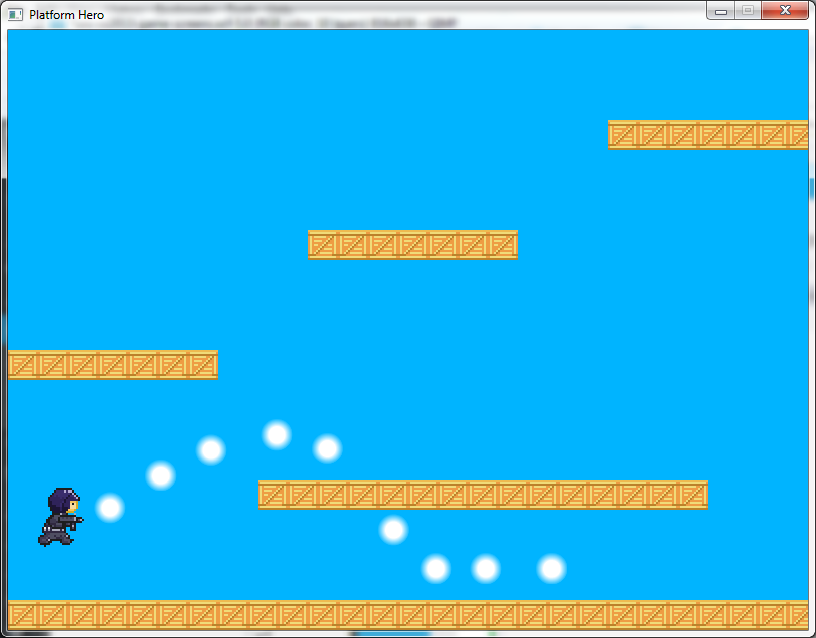Part 13 – Shooting and Spawners
Time for our hero to defend himself in the quest to reach the prize. He needs to shoot his gun.
What will we use for a bullet? There a few choices, but we'll go for particle.png in the orx/tutorial/data/object in the Orx project. And copy this to our data/texture folder.

Once copied, define it in the config:
[BulletGraphic] Texture = particle.png [BulletObject] Graphic = BulletGraphic Speed = (500, 0, 0) LifeTime = 1.0 Scale = 0.25
Any BulletObject that is created will be scaled down a little, sent flying off to to the right, and can only exist for 1 second before being auto-destroyed.
What is the best way to get our hero to shoot lots of these BulletObjects? A spawner is the thing to use.
A spawner can be attached to an object (like our hero). And it can be told to spawn a specific type of object (like a bullet). Let's take this approach to start with. It won't be perfect, but we can always improve it later.
Create a spawner for the hero:
[BulletSpawner] Object = BulletObject WaveSize = 1 WaveDelay = 0.1 Position = (10, -7, 0)
This spawner can shoot BulletObjects. It can shoot one at a time with 0.1 seconds between shots.
Time to attach it to the HeroObject:
[HeroObject] Graphic = HeroGraphic Position = (-350, 100, 0) Scale = 2 AnimationSet = HeroAnimationSet Body = HeroBody Spawner = BulletSpawner
Run it and your hero will be shooting:

Great, so that's working for us. Now, how to stop it from shooting. The function that is available to us for this purpose is: orxObject_Enable()
If we disabled our hero object, yes it would stop him from shooting, but it would also make him disappear. Not quite what is expected.
There are a number of ways to solve this situation. Let's go with a simple one.
What if the HeroObject had a single empty child object? And what if that child object had the spawner? Because it would be invisible, it wouldn't matter if it was turned on or off.
Define an empty object as the hero's gun:
[HerosGun] Spawner = BulletSpawner Position = (0, 0, 0)
Remove the spawner from the hero object, and make HerosGun a child of HeroObject:
[HeroObject] Graphic = HeroGraphic Position = (-350, 100, 0) Scale = 2 AnimationSet = HeroAnimationSet Body = HeroBody ChildList = HerosGun
When you run this, you'll notice little difference. Our hero is still firing. But now we can turn his gun off at the bottom of the Init() function.
But we need a reference to the gun in code, which we don't have yet because [HerosGun] was created automatically with HeroObject.
First declare the gun as a variable just like the hero object:
orxOBJECT *hero; orxOBJECT *herosGun;
Then, in the Init() function, get the child reference of the gun using the hero object:
hero = orxObject_CreateFromConfig("HeroObject"); herosGun = (orxOBJECT*)orxObject_GetChild(hero); orxObject_CreateFromConfig("Scene");
Now that you have the reference, turn off the herosGun immediately after creating it:
hero = orxObject_CreateFromConfig("HeroObject"); herosGun = (orxOBJECT*)orxObject_GetChild(hero); orxObject_Enable(herosGun, orxFALSE); orxObject_CreateFromConfig("Scene");
Compile and run.
Cool, he stopped shooting. The last thing, turn on, and off the shooting based on pressing the left control key in the Update():
if (orxInput_IsActive("Shoot")) { orxObject_Enable(herosGun, orxTRUE); } else { orxObject_Enable(herosGun, orxFALSE); }
Compile and run.
Hmmm… His bullets don't go left when the hero faces left. Change the spawner by adding ObjectSpeed and UseRelativeSpeed properties:
[BulletSpawner] Object = BulletObject WaveSize = 1 WaveDelay = 0.1 Position = (0, -6, 0) ObjectSpeed = (1500, 0, 0) UseRelativeSpeed = true
The ObjectSpeed property overrides the Speed property in the BulletObject (no it's not really needed anymore) and the UseRelativeSpeed means the ObjectSpeed with be applied relative to the direction of the spawner.
Compile and Run.
Fantastic! Our hero can now run, jump, and shoot.
Next: Part 14 - FX.